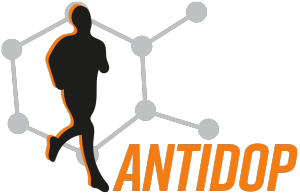Downloads
In this page you can find freely distributed documents related to the AntiDop project outputs (Open Access)

Deliverables
Here you can find a list of the Public Deliverables of the project (final versions). You can download them in a pdf format.

Scientific Publications
This is a list of scientific articles published so far by our consortium members (journals and conferences)

Newsletter
Learn the latest news, scientific results and project outcomes, as well as future events through our Newsletter.
Project Outcomes
Public Deliverables
This document covers the Periodic Management Reports, the Risk Management Plan, the Ethics, the Safety & Privacy Management Action Plan and a Report on Internal Evaluation & QA. This is a Mid-term evaluation report.
Includes all relevant information about the meetings, proofs of meetings, minutes,
conclusions, as well as strengths and weaknesses from the partner’s cooperation in the project
Research findings on existing training and
awareness raising interventions, athlete support services, their results, policies and standards. Download D2.1.
The training requirements for ASP will be reported, i.e. the findings of the PACT analysis, 1-to-1 interviews and Focus Group with ASP representatives. Download D2.2.
Description of the learning strategy, a route from scientific to learning models, performance, indicators to measure learning results and the envisioned learning services. Download D3.1.
A document to report all decisions made
regarding the overall plan of the Trainning
Missions, including training strategies and
learning design principles.
Educational materials and interactive content for the AntiDop platform (in Greek,
German, Serbian, Dutch, Maltese and Lithuanian languages)
The Learning Management System (LMS) and tools to be used by the pilot studies to deliver Training Missions
Report on pilot oreparation activities, pilot studies assessment and lessons learned from the Training Missions.
All communication and dissemination material produced during the project, report on publications, dissemination & exploitation activities performed within AntiDop
Business Model and the Intelectual Property Rights (IPR) Management Plan (Restricted).
journals & conferences
Scientific Publications
This list contains the publications of the team members in scientific journals and conferences
Conference
EFAD Congress (October 2025, Sweden)
A first announcement of the project will take place in the EFAD Congress in Malmö – Sweden., 24 & 25 October 2025.
Conference
15th ICCE Global Coach Conference (November 2025, Athens)
AntiDop has plans to participate in the EFAD Congress to be held in Athens – Greece., 20-23 November 2025.
1st Version
Suspendisse The firast version of the AntiDop Newsletter is expected on June 2025.
Wanna be the first to step up?
Do it legaly, safely and fully informed. Thus, read more on what our experts have to propose…
A collection of useful sites with additional educational recources
wada
In the WADA site yoy can find the World Anti-Doping Code, Annual list of banned substances and methods in- and out-of-competition, Tools like Global DRO to check the status of medications, educational content, policy paper, info on National Anti-Doping Organizations (NADOs) and more.
IOC
The International Olympic Committee (IOC) is the authority responsible for organizing the Summer, Winter, and Youth Olympics. Moreover, IOC is governing the National Olympic Committees (NOCs) and the global Olympic Movement. Apart from the mission and values of Olympism, you can find info about various ethics initiatives and Anti-doping policies.
SIGA
Sport Integrity Global Alliance (SIGA) promotes integrity, transparency, and accountability in sports worldwide.The website of SIGA can be used to find additional content like policy recommendations, white papers on how to strengthen anti-doping frameworks, as well as webinars and learning series on integrity in sport.

Funded by the European Union, under the Erasmus+ SPORT funding framework (Project No.: 101184932). Views and opinions expressed are however those of the author(s) only and do not necessarily reflect those of the European Union or the European Education and Culture Executive Agency (EACEA). Neither the European Union nor EACEA can be held responsible for them.
